Related Research Articles
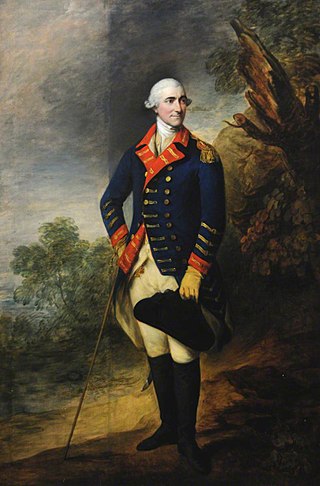
Field Marshal Henry Seymour Conway was a British general and statesman. A brother of the 1st Marquess of Hertford, and cousin of Horace Walpole, he began his military career in the War of the Austrian Succession. He held various political offices including Chief Secretary for Ireland, Secretary of State for the Southern Department, Leader of the House of Commons and Secretary of State for the Northern Department. He eventually rose to the position of Commander-in-Chief of the Forces.

Lieutenant-General John Manners, Marquess of Granby was a British Army officer, politician and nobleman. The eldest son of John Manners, 3rd Duke of Rutland, as he did not outlive his father and inherit the dukedom, Manners was known by his father's subsidiary title, Marquess of Granby. He served in the military during the Jacobite rising of 1745 and the Seven Years' War, being subsequently rewarded with the post of Commander-in-Chief of the Forces. Manners was popular with the troops who served under him and many British pubs are still named after him today.
Field Marshal James O'Hara, 2nd Baron Tyrawley and 1st Baron Kilmaine, PC, was an Irish officer in the British Army. After serving as a junior officer in Spain and the Low Countries during the War of the Spanish Succession, he went on to become British ambassador to Lisbon establishing a close relationship with King John V there. He undertook a tour as British ambassador to Saint Petersburg before becoming Governor of Gibraltar where he set about improving the fortifications. He was briefly commander of British troops in Portugal during the Seven Years' War but was replaced within a few months. During his military career, he was colonel of eight different regiments.

Field Marshal Sir George Howard KB, PC was a British military officer and politician. After commanding the 3rd Regiment of Foot at the Battle of Fontenoy in May 1745 during the War of the Austrian Succession and after commanding that regiment again at the Battle of Falkirk Muir and the Battle of Culloden during the Jacobite Rebellion, he returned to the continent and fought at the Battle of Lauffeld. He went on to command a brigade at the Battle of Warburg during the Seven Years' War. He subsequently became the Governor of Minorca.
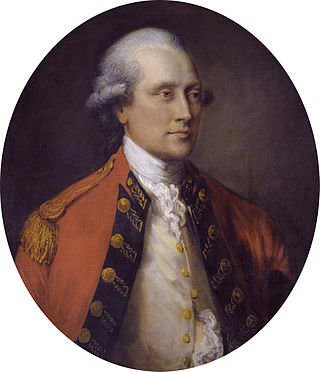
Field Marshal John Campbell, 5th Duke of Argyll, styled Marquess of Lorne from 1761 to 1770, was a Scottish soldier and nobleman. After serving as a junior officer in Flanders during the War of the Austrian Succession, he was given command of a regiment and was redeployed to Scotland where he opposed the Jacobites at Loch Fyne at an early stage of the Jacobite Rebellion and went on to fight against them at the Battle of Falkirk Muir and then at the Battle of Culloden. He later became adjutant-general in Ireland and spent some 20 years as a Member of Parliament before retiring to Inveraray Castle.

Field Marshal John Griffin Griffin, 4th Baron Howard de Walden, 1st Baron Braybrooke, , KB, of Audley End in Essex, was a British nobleman and soldier. He served as a junior officer with the Pragmatic Army in the Netherlands and Germany during the War of the Austrian Succession. After changing his surname to Griffin in 1749, he commanded a brigade of at least four battalions at the Battle of Corbach in July 1760 during the Seven Years' War. He also commanded a brigade at the Battle of Warburg and was wounded at the Battle of Kloster Kampen.

Field Marshal Studholme Hodgson was a British Army officer who served during the 18th century. After serving as an Aide-de-Camp to the Duke of Cumberland at the Battle of Fontenoy during the War of the Austrian Succession and at the Battle of Culloden during the Jacobite Rebellion, he became correspondent to William Barrington, the Secretary at War, during the French and Indian War. He went on to command the British expedition which captured Belle Île in June 1761 during the Seven Years' War so enabling the British Government to use the island as a bargaining piece during the negotiations leading up to the Treaty of Paris in 1763.
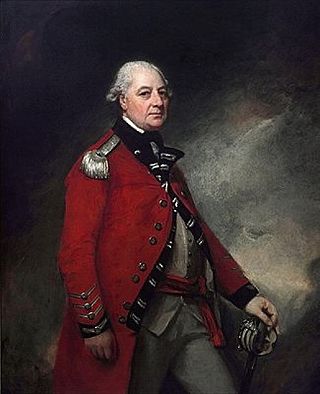
Field Marshal George Townshend, 1st Marquess Townshend, PC, known as The Viscount Townshend from 1764 to 1787, was a British soldier and politician. After serving at the Battle of Dettingen during the War of the Austrian Succession and the Battle of Culloden during the Jacobite Rising, Townshend took command of the British forces for the closing stages of the Battle of the Plains of Abraham during the Seven Years' War. He went on to be Lord Lieutenant of Ireland or Viceroy where he introduced measures aimed at increasing the size of Irish regiments, reducing corruption in Ireland and improving the Irish economy. In cooperation with Prime Minister North in London, he solidified governmental control over Ireland. He also served as Master-General of the Ordnance, first in the North Ministry and then in the Fox–North Coalition.
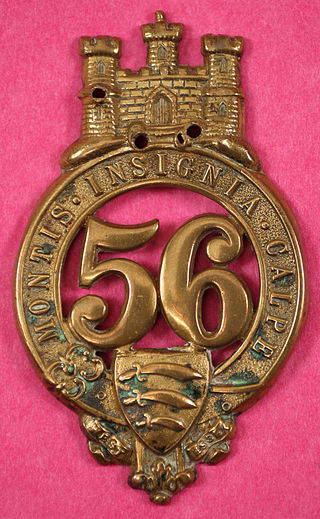
The 56th Regiment of Foot was an infantry regiment in the British Army, active from 1755 to 1881. It was originally raised in Northumbria as the 58th Regiment, and renumbered the 56th the following year when two senior regiments were disbanded. It saw service in Cuba at the capture of Havana in the Seven Years' War, and was later part of the garrison during the Great Siege of Gibraltar in the American Revolutionary War. During the French Revolutionary Wars it fought in the Caribbean and then in Holland. On the outbreak of the Napoleonic Wars the 56th raised a second battalion in 1804 as part of the anti-invasion preparations; both saw service in India and in the Indian Ocean, with the first capturing Réunion and Mauritius. A third battalion was formed in the later years of the war, but was disbanded after a brief period of service in the Netherlands.
General Lord Robert Manners was an English soldier and nobleman. He was a son of John Manners, 2nd Duke of Rutland and his second wife, Lucy Sherard.
John Stanwix was a British soldier and politician.
General The Hon. James St Clair was a Scottish soldier and Whig politician.
Lieutenant-General James Durand was a British soldier.
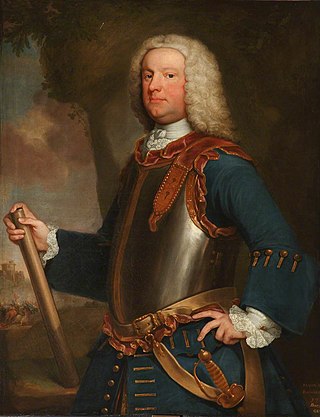
Lieutenant-General Richard Onslow was a British Army officer and politician. After the death of their parents, his older brother Arthur bought him a captain's commission in the British Army. He first saw action in the Anglo-Spanish War in 1727, after which he was returned to Parliament for the family borough of Guildford. His political contributions were negligible in comparison to his brother, and he continued to serve as a career officer, holding commands in the War of the Austrian Succession at Dettingen and Fontenoy. In 1759, he was appointed Governor of Plymouth and commander of the Western District, and died as a lieutenant-general the following year while presiding over two prominent courts-martial.
General Joseph Yorke, 1st Baron Dover KB, PC, styled The Honourable Joseph Yorke until 1761 and The Honourable Sir Joseph Yorke between 1761 and 1788, was a British soldier, diplomat and Whig politician.
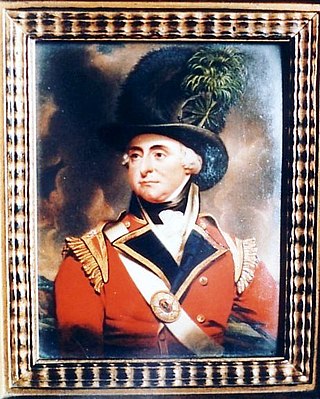
General Robert Manners was a British Army officer and Member of Parliament.
Lieutenant-General Robert Napier was an officer of the British Army.
General Francis Leighton was a general of the British Army.
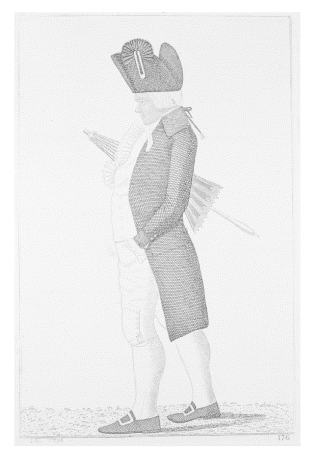
General Alexander Mackay was a Scottish soldier in the British Army, and a politician. The son of George Mackay, 3rd Lord Reay, he was the younger brother of George Mackay of Skibo (c.1715–1782).

Major-general David Watson (1704–1761) of the Royal Engineers was a Scottish officer and military engineer in the British Army.
References
- Notes
- ↑ "No. 8437". The London Gazette . 1 June 1745. p. 4.
- ↑ "No. 9930". The London Gazette . 11 September 1759. p. 1.
- Sources
- Cannon, Richard (1844). Historical Record of the Fifty-Sixth, or the West Essex Regiment of Foot. London: Parker, Furnivall and Parker. Digitised copy